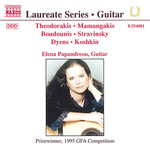
Elena Papandreou - Guitar Recital
 $25.00
Low Stock
add to cart
$25.00
Low Stock
add to cart
THEODORAKIS / MAMANGAKIS / BOUDOUNIS / STRAVINSKY / etc
Elena Papandreou - Guitar Recital
Elena Papandreou (guitar)
[ Naxos Guitar Laureate Series / CD ]
Release Date: Sunday 2 February 1997
Should this item be out of stock at the time of your order, we would expect to be able to supply it to you within 2 - 5 business days.
Nikos Mamangakis was born in Crete to a family of folk musicians and his formal studies in music were in Athens and Germany. His prolific output includes music for many media and embraces a wide range of compositional styles; he is resistant to received conventions and is well known and respected for his originality of thought and musical deed. The items in the Folk Suite bear the titles of folk-songs, usually accompanied by various instruments, but Mamangakis comments: "All modern Greek folk-music, rebetica songs, was composed on either the guitar or bouzouki and passed afterwards to other instruments. The guitar has thus played a leading rôle in this music". Hroes is one of a group of solo-instrumental pieces. It is strictly improvised music which eschews "monolithic musical tendencies". Mamangakis adds: "Hroes is a word that was used a great deal in ancient Greek and Byzantine music It signifies nuances - in these pieces, of colour".
The Tunisian-born French guitarist/composer Roland Dyens formally studied the guitar, composition and orchestration in Paris, since when he has developed a highly successful international career and a reputation for the originality of his compositions. His fascination with Latin American music is, given his background, curious, but stimulating Saudude No. 3 ('Longing') is subtitled Lembrança do Senhor do Banfim da Bahia ('Remembrance of Senhor Bonfim, a saint whose festival is celebrated annually in the streets of Bahia'), a "kind of homage to Brazilian Nordeste (northeast) and its African culture". The opening section, Rituel, is a very free, unmeasured improvisation, the second is a dance in the baiao rhythm typical of Bahia, and the Finale is "maybe my vision of this folk-music". Tango en Skaï began in 1978 as an improvisation but was not published until 1985, since when it has become a regular part of the repertory. It is a caricature of the Argentine tango; as Dyens himself says: "Skaï in French means imitation leather, maybe worse than bad plastic! It has to be played with a lot of humour, a maximum of dynamics and a minimum of ruhato. Not at all 'classico-seriously'!".
Nikita Koshkin showed an early interest in music - when he was four his favourite composers were Shostakovich and Stravinsky, but he did not begin to study music and the guitar until he was fourteen. It was in the early 1980s that he first became internationally known for his suite The Prince's Toys, revealing himself as a composer who responds strongly to extra-musical programmatic images, and is unusually inventive in creating idiomatic effects, which he skilfully brings to the service of his music. Since 1990 he has been able to visit many other countries on both sides of the Atlantic. It was the thought: "The piano has concert-scale waltzes like Listz's Mephisto Waltz, why shouldn't the guitar have one" that prompted the composition of the Usher Waltz. It is of course Usher, the fall of whose House was recorded by Edgar Allan Poe. He writes: "The romantic-stylized theme receives a mighty dramatic development and reflects not only Usher's (crazy) way of playing the guitar and his increasing madness, but the mood of the story as a whole. The piece ends in a gloomy and tired coda".
Tracks:
Mamangakis, Nikos:
Folk Dance Suite
Stravinsky, Igor:
The Soldier's Tale (arr. Mamangakis)
Dyens, Roland:
Saudade No. 3
ango en Skai
Koshkin, Nikita:
Usher Waltz
Dissolving Light
Sob of Angels
Mamangakis, Nikos:
Hroes
Boudounis, Vangelis:
Eight Summaries